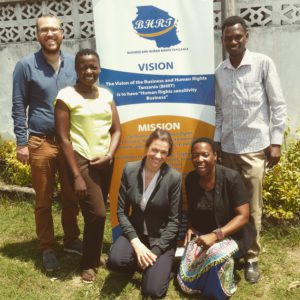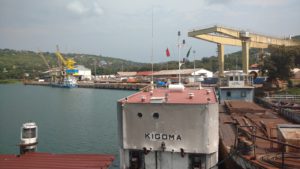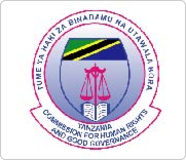 IPIS was in Dar es Salaam to launch its new project on Business & Human Rights with the Tanzanian Commission for Human Rights and Good Governance (CHRAGG) and Business and Human Rights Tanzania (BHRT). Tanzania is bearing the fruits of the accelerating economic growth and rising influx of foreign direct investment (FDI), but is also struggling with the enormous challenges in the area of business and human rights (B&HR) this brings along. These span diverse issues including labour, health and safety conditions, gender discrimination, forced evictions, excessive violence against civilians, environmental pollution and child labour.
IPIS was in Dar es Salaam to launch its new project on Business & Human Rights with the Tanzanian Commission for Human Rights and Good Governance (CHRAGG) and Business and Human Rights Tanzania (BHRT). Tanzania is bearing the fruits of the accelerating economic growth and rising influx of foreign direct investment (FDI), but is also struggling with the enormous challenges in the area of business and human rights (B&HR) this brings along. These span diverse issues including labour, health and safety conditions, gender discrimination, forced evictions, excessive violence against civilians, environmental pollution and child labour.
In spite of these severe challenges, most Tanzanians are unaware of their rights, as well as the diverse duties and responsibilities of state actors and companies under the United Nations (UN) Guiding Principles for B&HR. With the financial support of the European Instrument for Democracy and Human Rights (EIDHR), IPIS, CHRAGG and BHRT therefore decided to join forces to lift the B&HR agenda to a higher level in Tanzania. The project aims at building local and national capacities for improved reporting, fact-finding, monitoring and follow-up of corporate human rights harm in order to enhance protection, prevention, accountability and remedy.
To achieve this, IPIS and its partners will engage in three main interconnected activities:
1. Incident reporting, fact-finding and follow-up
Through a three-pronged approach, IPIS, CHRAGG and BHRT will work to improve the reporting, fact-finding and follow-up of corporate human rights harm, with particular attention to the protection of vulnerable groups. Firstly, we want to give a stronger voice to local (and often remote) communities and end the underreporting of corporate human rights incidents. This will be done by updating CHRAGG’s mobile complaint mechanism, setting up a dedicated awareness-raising campaign, and training CHRAGG’s investigating officers to handle B&HR-related complaints promptly and efficiently. Secondly, CHRAGG and BHRT officers will form joint fact-finding teams, exploiting the complementarity of their respective mandates as, respectively, National Human Rights Institution (NHRI) and civil society watchdog. These teams will be available for rapid deployment and trained to independently collect accurate information through a mobile data collection system set up by IPIS.
2. Research, mapping
 IPIS, CHRAGG and BHRT will contribute to filling existing data gaps regarding the scope, scale and nature of the corporate impact on human rights in three main ways.Firstly, we will design and operate a database on B&HR related incidents in Tanzania. This will allow structured analysis of key challenges and trends, disaggregated for the types of incidents, perpetrators, victims, sectors, etc. This analysis will be visualised on an interactive webmap that can be tweaked to meet the needs of various data users. A second key activity under this heading is editorial support for local civil society. Local civil society organizations often have a unique access to information on B&HR challenges, but can struggle to get their voice heard. Therefore, we will each year publish a call for abstracts to select 5 organisations that will receive hands-on support to publish the findings of their work in an edited ‘Voices from Tanzania’ publication.
IPIS, CHRAGG and BHRT will contribute to filling existing data gaps regarding the scope, scale and nature of the corporate impact on human rights in three main ways.Firstly, we will design and operate a database on B&HR related incidents in Tanzania. This will allow structured analysis of key challenges and trends, disaggregated for the types of incidents, perpetrators, victims, sectors, etc. This analysis will be visualised on an interactive webmap that can be tweaked to meet the needs of various data users. A second key activity under this heading is editorial support for local civil society. Local civil society organizations often have a unique access to information on B&HR challenges, but can struggle to get their voice heard. Therefore, we will each year publish a call for abstracts to select 5 organisations that will receive hands-on support to publish the findings of their work in an edited ‘Voices from Tanzania’ publication.
Finally, the project partners will publish a periodical briefing on B&HR in Tanzania gathering and analysing key news articles, reports and events. This briefing will serve as a communication platform with the project’s multiple stakeholders to inform and sensitise them on the various aspects of B&HR in Tanzania, and the world.
3. Multi-stakeholder dialogues
In order to tear down walls and build mutual understanding between the different target groups, multi-stakeholder dialogues form a key project component. These will also be an exercise in awareness-raising, and ensuring that the action is borne by a wide network of stakeholders. These include civil society, state actors, workers’ organisations, industry organisations, research institutes, foreign state actors, international organisations, etc. Simultaneously, we will take these opportunities to advance the debate and build consensus on the National Action Plan (NAP) for Business and Human Rights in Tanzania.
In the first place we will organise multi-stakeholder consultations to select a pressing annual focal sector. This will allow focussing time and energy within the project and with the stakeholders, amidst the plethora of B&HR challenges Tanzania faces.
At the end of each year, the project partners will organise a national multi-stakeholder conference to present the activities of the past year, stimulate discussion, collect feedback and introduce the selected focal sector for the next year. Each time, one side-session for a specific stakeholder group will be attached to the conference to stimulate self-reflection and lesson learning.
Finally, in order to end the underrepresentation of actors that are not present in Dar es Salaam (or other major cities), we will organise regional multi-stakeholder dialogues in at least half of Tanzania’s 26 regions.
More info: Lotte.Hoex@ipisresearch.be




